For three decades, Nir Gess has been involved in numerous and varied projects in Africa, most recently in Malawi, where he serves as Malawi’s Honorary Consul to Israel. Most of his latest projects involve agriculture, including one that consists of a giant hydroponics farm, which works under the guidance of Israel’s Volcani Institute and aims to provide Malawi with enough high quality fresh vegetables to meet all the country’s needs, thus removing the necessity for importing produce from South Africa.
Maxwell Matewere is a Malawian law enforcement expert, author of the book Human Trafficking in Malawi; the Untold Stories (Barnes and Noble), a public figure and, for more than twenty years, a passionate campaigner against human trafficking. The two first met about two years ago in a hotel lobby in Lilongwe, the country’s capital.
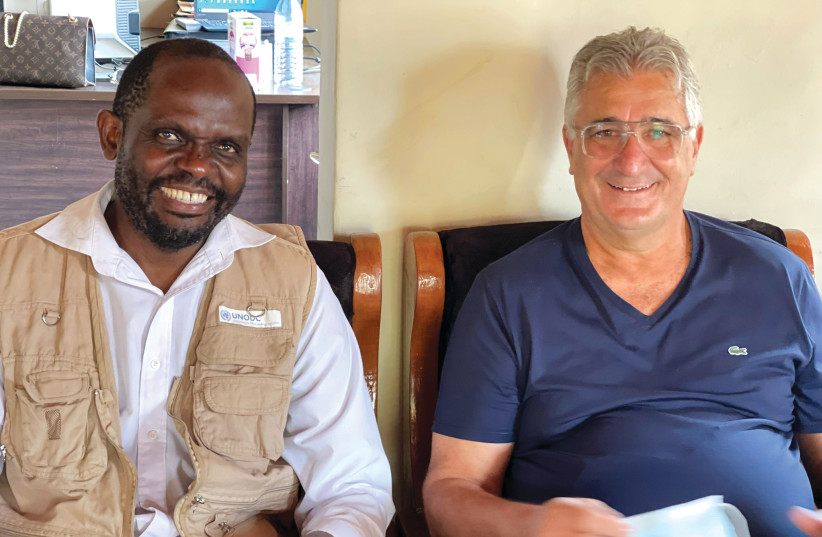
They introduced themselves to each other and proceeded to exchange information about each other. Matewere described his life’s work – rescuing and rehabilitating victims of human trafficking in Africa. Gess, despite his many years in Africa, knew virtually nothing about the machinations and the horrors of human trafficking. He was immediately drawn in and began to offer ways for dealing with this vile crime against humanity. They continued meeting, discussing the subject of human trafficking and all its ramifications and Matewere invited Gess to the launch of his book.
Matewere: “He is the Consul for Malawi in the State of Israel. His Excellency Nir Gess. He came to me with a case of Malawian girls trafficked to Europe. I listened to his story and acted on it.. Boom!! it was another big rescue of Malawian girls. However l took advantage of our discussion to share the biggest problem that victims of human trafficking face in Malawi. He immediately agreed to start providing support that saw the first ever safe house for female victims of human trafficking in Malawi, Beth Israel Safe Home. In the first instance: to remove the victims out of the hands of the traffickers and place them in a safe place.”
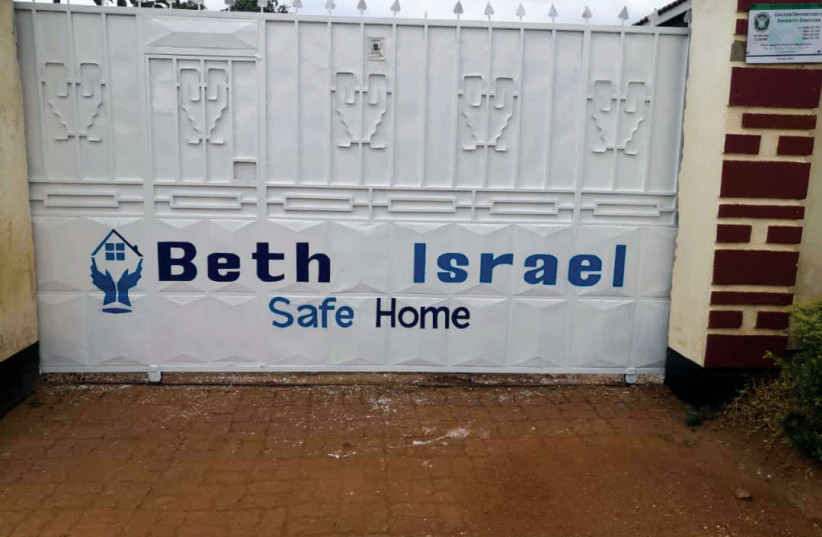
Gess began working with the United Nations to build a case – a lengthy process that took up many months. There were more immediate problems to solve: “What happens to the girls in the meantime,” Gess asked, to which Matewere replied, “They are taken to jail, together with their captors.”
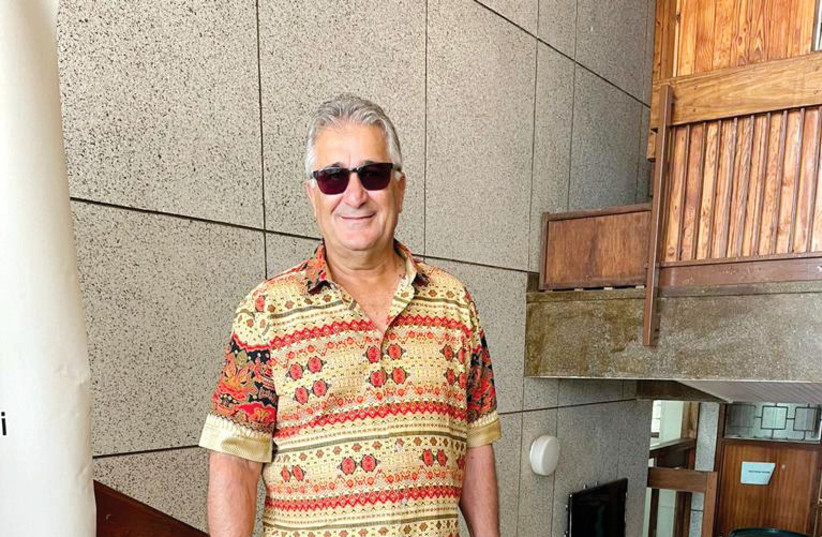
For Gess, this information flashed a red light. The lack of anywhere to remove them to, away from further danger, literally meant that they were placed in the same prison cells as the men who had kidnapped, abused and tortured them.
Gess asked, “Why is there no safe place in which to place the victims?” Matewere replied that there was currently no available funding for a place in which to shelter the some 100 imprisoned women and girls. At that time most of the girls were around the age of 15.
Gess said: “Let’s set up a safe place for them, for the some 100 women and girls currently sharing prison cells with their captors and abusers.”
No sooner said than done and suitable premises were located and secured. Within a few days, the building, which was given the name “Beth Israel Safe Home,” underwent a thorough overhaul, cleaned, painted, and furnished. As soon as it received official approval from the local authorities – who, from the onset were very helpful and supportive, as well as all the relevant government ministries: Inland Security, Health and Education, as well as the Ministry of Gender – all joined in enthusiastically, eager to participate in the effort to wipe out the vile phenomenon of human trafficking in Malawi.
Teams of workers, all female, were recruited to work in the shelter, but not before undergoing a rigorous training program. Teachers, counselors, social workers and psychologists joined the program to learn the special needs of the emotionally wounded trafficked girls, Since the rescue at this stage was of women only – men and boys, although also susceptible to similar treatment on the part of human-traffickers, are not included, for obvious reasons, although there are hopes to replicate similar safe houses for them in the future.
Beth Israel Safe Home is not open to male visitors. Indeed all males visitors (including Matewere and Gess) are required to coordinate visits with local schools and authorities in order to meet the home’s residents. The security of the women and girls is paramount.
After many months of being separated from their families – sold to the runners of human trafficking, the girls and young women were experiencing a total loss of self confidence, they had lost all awareness of themselves. Their very identity had been stolen from them and they sought all the comfort they could muster. Thus, girls would huddle together, two, three or more to a room, sometimes even sharing beds.
At the moment, the youngest girl is 9 months old Michali, the daughter of a 13 year old victim. The current batch of female residents range in age from 9 months to 15 years.
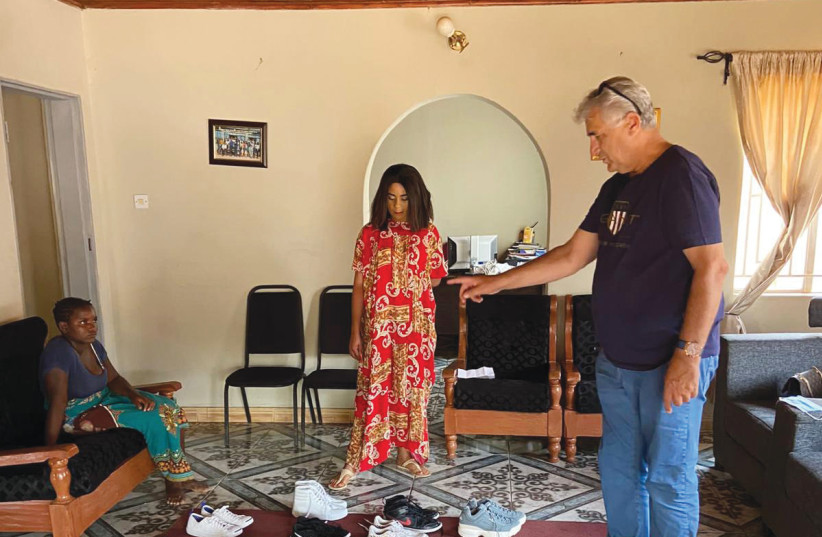
Gess is thoroughly backed by his own organization and carefully supervised by the Malawi Ministries of Internal Security, Health and Welfare, Education and Gender, who are all involved making Beth Israel a success.
And things are moving quickly. When information arrives in the morning regarding a group of rescued girls, they are taken that day to the safe house, where they are registered, meet a psychologist and other professionals, and given all the necessary assistance to settle in.
Quality nutrition is a key issue in the Home, to boost the residents’ immune system after the horrors, including malnutrition, they have experienced. The Safe Home is provided with daily consignments of fresh vegetables, eggs and fish etc., all fresh from the farm. They are all given brand new clothes, to raise their spirits and instill in them a renewed sense of self respect. Their school equipment, pens, pencils, erasers, notebooks textbooks, etc. is all brand new, just like schoolchildren in Israel.
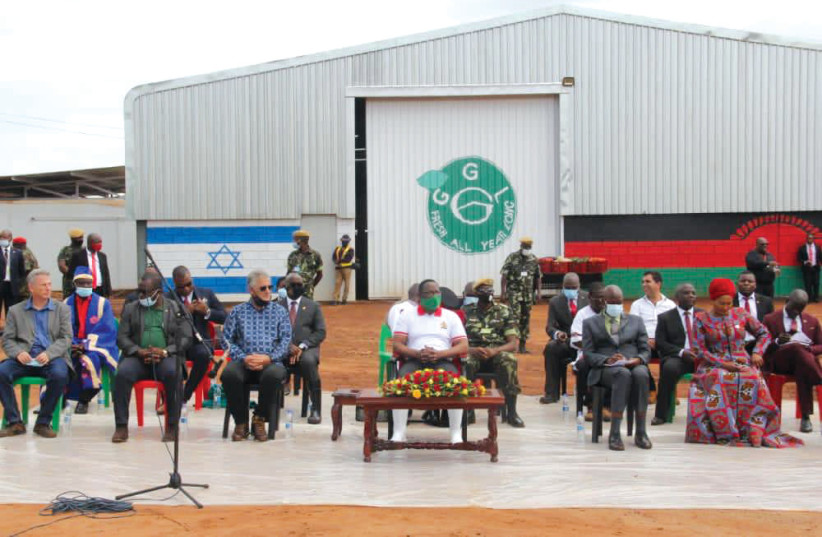
The girls all attend regular state schools, where they spend regular hours. They all leave the Safe Home as a group, together. Never alone. They are constantly watched over. After regular school hours, they remain in school for extra-curricular activities, including various arts and crafts.
Everything has to be by the book and there is no margin for error. Gess is hoping to set up a program for Israeli volunteers to do a pre-military year of service year. Such volunteers will be carefully chosen, according to well defined criteria and they will enjoy the full support of the Malawi government authorities. The Safe Home has received visits from representatives of the Bill Gates Foundation, the World Health Organization and other international humanitarian organizations. The WHO representative arrived from the organization’s HQ in Zimbabwe and remains in constant contact with Gess and his people.
Proposals are now being raised for the project to be replicated elsewhere and to provide a safe place for male victims of human trafficking.
Attempts to return victims to their countries of origin are proving difficult, since many of them were registered as dead, as soon as they were kidnapped and/or sold. There are hopes to of placing them in adoptive families, but there are problems here, too.
Gess: “The majority of girls rescued on the borders with other African countries – on the way into, or out of Malawi are not native to Malawi, which is a landlocked country. It is thus possible to apprehend trucks containing kidnapped girls and young women from neighboring countries, traveling across the country from such places as Tanzania, Zambia and Mozambique, bound for Saudi Arabia, Bahrain or Dubai. We are able to pick them up on the borders and break at least this chain of human trafficking. We are doing our best. To date, 100 girls have definitely been rescued. You never know what you are going to discover. There are no registered numbers of victims of human trafficking, although there is some data in the UK. Our work is in addition to, not instead of, every other activity.”
Gess sees this work as a personal mission. In the past, he has fought against some of the worst people in the world, but he sees this enterprise as the most important of his life.
As he says, “plucking a little six or seven-year old girl from her home and family, is like picking a grape from the vine. Taking her to some of the most horrible places on earth, where she will be constantly abused and made to do abominable chores, while most of the world turns a blind eye, is a crime that deserves to be punishable by death; because when you traffic in human lives, your actions are worse than killing them; you are robbing them of their soul, their identity and their humanity.”
He was shown a video of an opened container, on a truck transferring “merchandise” from Ethiopia, across Malawi on its way to Mozambique.There were fifty-three young boys in the container. 0nly three survived the journey and it was the stench that fouled the air at the border crossing that aroused the attention of the resident officials.
There are records of girls being kept for 20 days in the foul air of a locked container. On another occasion, a truck was apprehended on the Malawi border, with a “cargo” consisting of eight young girls together with a herd of goats. The picture of small girls, hungry, covered in feces, barely able to breath are virtually indescribable. As Nir says: “The world must stop this horrendous trade, it must not agree to it. The world knows who those are who are responsible: Saudi Arabia, Zimbabwe and others, nothing is clandestine, it is all visible, for everyone to see.”
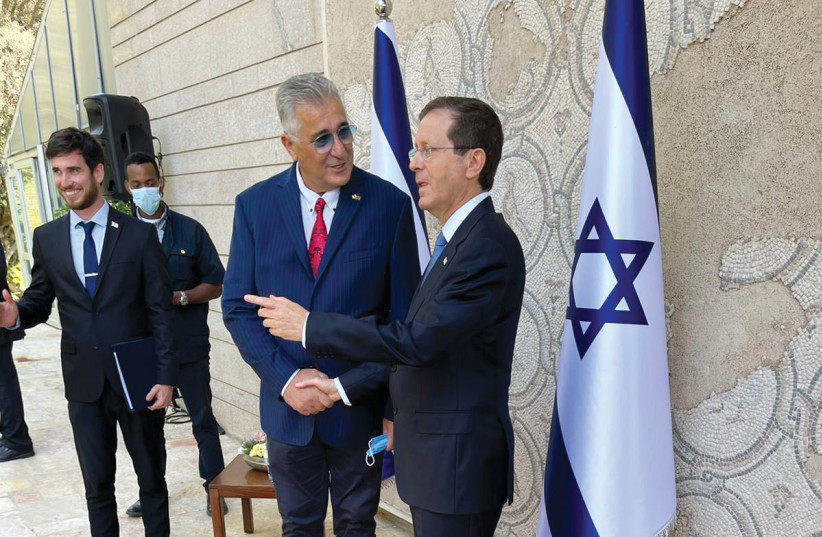
Ultimately, there has to be a way to make those criminals understand that being stopped and arrested on the Malawi border makes their human trafficking activity simply not worth their while.
Another nauseating crime against humanity in Africa consists of trafficking in the limbs and organs of albinos. Legs as well as internal body parts, are removed from these people in order to to be used in in religious ritual.
As girls are rehabilitated and their numbers decrease in the Safe Home, new girls take their place after being rescued at border checkpoints The hope and objective of Beth Israel Safe Home is to eradicate the phenomenon altogether. When a girl is considered rehabilitated (which can be between one to two years in the safe house, she is accompanied by house staff to her new placements home, where she receives new documentation and a new identity.
Gess doesn’t deal with the professional (sociological/psychological) side of the war on human trafficking as he has no professional experience, but he is constantly obtaining more and more knowledge. He is happy to stand on the sidelines, providing as much help and support as he can.
